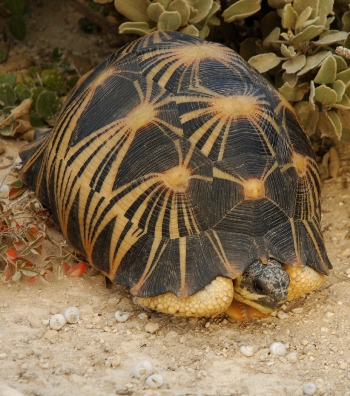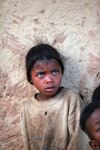The radiated tortoise, once common throughout Madagascar, faces extinction within the next 20 years due to poaching for its meat and the illegal pet trade, according to biologists with the Turtle Survival Alliance (TSA) and the Wildlife Conservation Society (WCS).
Returning from field surveys in southern Madagascar’s spiny forest, they found regions without a single turtle. Locals said that armed bands of poachers were taking truckloads of tortoises to be sold in meat markets. The tortoise is also popular in the underground pet trade, although it is protected by CITES (Convention on International Trade in Endangered Species).
“Areas where scores of radiated tortoises could be seen just a few years ago have been poached clean,” said James Deutsch, director of the Wildlife Conservation Society’s Africa Program. “Back then one could hardly fathom that this beautiful tortoise could ever become endangered, but such is the world we live in, and things can—and do—change rapidly.”
 Porbeagle shark being prepared. Photo by: Matthieu Deute. |
Once considered the world’s most abundant tortoise with an estimated population in the millions, the radiated tortoise is today classified by the IUCN Red List as Critically Endangered.
Researchers say that poachers, having decimated the tortoise near populated areas, are now moving into protected areas. A government coup and continued political instability has opened up many of Madagascar’s world-renowned parks to illegal logging and poaching for the tortoise and even lemurs. Parks are understaffed making enforcement of anti-poaching laws difficult, if not impossible.
In addition to poaching, the tortoise’s habitat has been degraded. The spiny forest has been infiltrated by exotic species after being burned and cleared for agriculture. Today the spiny forest, also home to several lemur species, is Madagascar’s most endangered forest.
“Radiated tortoises are truly under siege now as never before, and if we can’t draw a line in the sand around protected areas, then we will lose this species,” said Rick Hudson, president of the TSA. “I can’t think of a tortoise species that has undergone a more rapid rate of decline in modern times, or a more drastic contraction in range, than the radiated tortoise. This is a crisis situation of the highest magnitude.”
In addition, drought and falling agricultural production has increased the poverty of Madagascar’s people, leading many to poach tortoises for food and money. Two thirds of the population in Madagascar lives below the international poverty line.
International aid money has dried up in Madagascar following the coup with many environmental and social NGOs forced to close their doors.
Related articles
How to end Madagascar’s logging crisis

(02/10/2010) In the aftermath of a military coup last March, Madagascar’s rainforests have been pillaged for precious hardwoods, including rosewood and ebonies. Tens of thousands of hectares have been affected, including some of the island’s most biologically-diverse national parks: Marojejy, Masoala, and Makira. Illegal logging has also spurred the rise of a commercial bushmeat trade. Hunters are now slaughtering rare and gentle lemurs for restaurants.
Coup leaders sell out Madagascar’s forests, people

(01/27/2010) Madagascar is renowned for its biological richness. Located off the eastern coast of southern Africa and slightly larger than California, the island has an eclectic collection of plants and animals, more than 80 percent of which are found nowhere else in the world. But Madagascar’s biological bounty has been under siege for nearly a year in the aftermath of a political crisis which saw its president chased into exile at gunpoint; a collapse in its civil service, including its park management system; and evaporation of donor funds which provide half the government’s annual budget. In the absence of governance, organized gangs ransacked the island’s biological treasures, including precious hardwoods and endangered lemurs from protected rainforests, and frightened away tourists, who provide a critical economic incentive for conservation. Now, as the coup leaders take an increasingly active role in the plunder as a means to finance an upcoming election they hope will legitimize their power grab, the question becomes whether Madagascar’s once highly regarded conservation system can be restored and maintained.
Appalling photos reveal lemur carnage in Madagascar [warning: graphic images]

(08/20/2009) New pictures released by Conservation International depict a troubling development in Madagascar: the emergence of a commercial bushmeat market for lemurs. In the aftermath of a March coup that saw Madagascar’s president replaced at gunpoint by the capital city’s mayor, Madagascar’s reserves — especially in the northern part of the country — were ravaged by illegal loggers. Armed bands, financed by foreign timber traders, went into Marojejy and Masoala national parks, harvesting valuable hardwoods including rosewood and ebonies. Without support from the central government — or international agencies that pulled aid following the coup — there was no one to stop the carnage. But now it emerges that timber wasn’t the only target.







